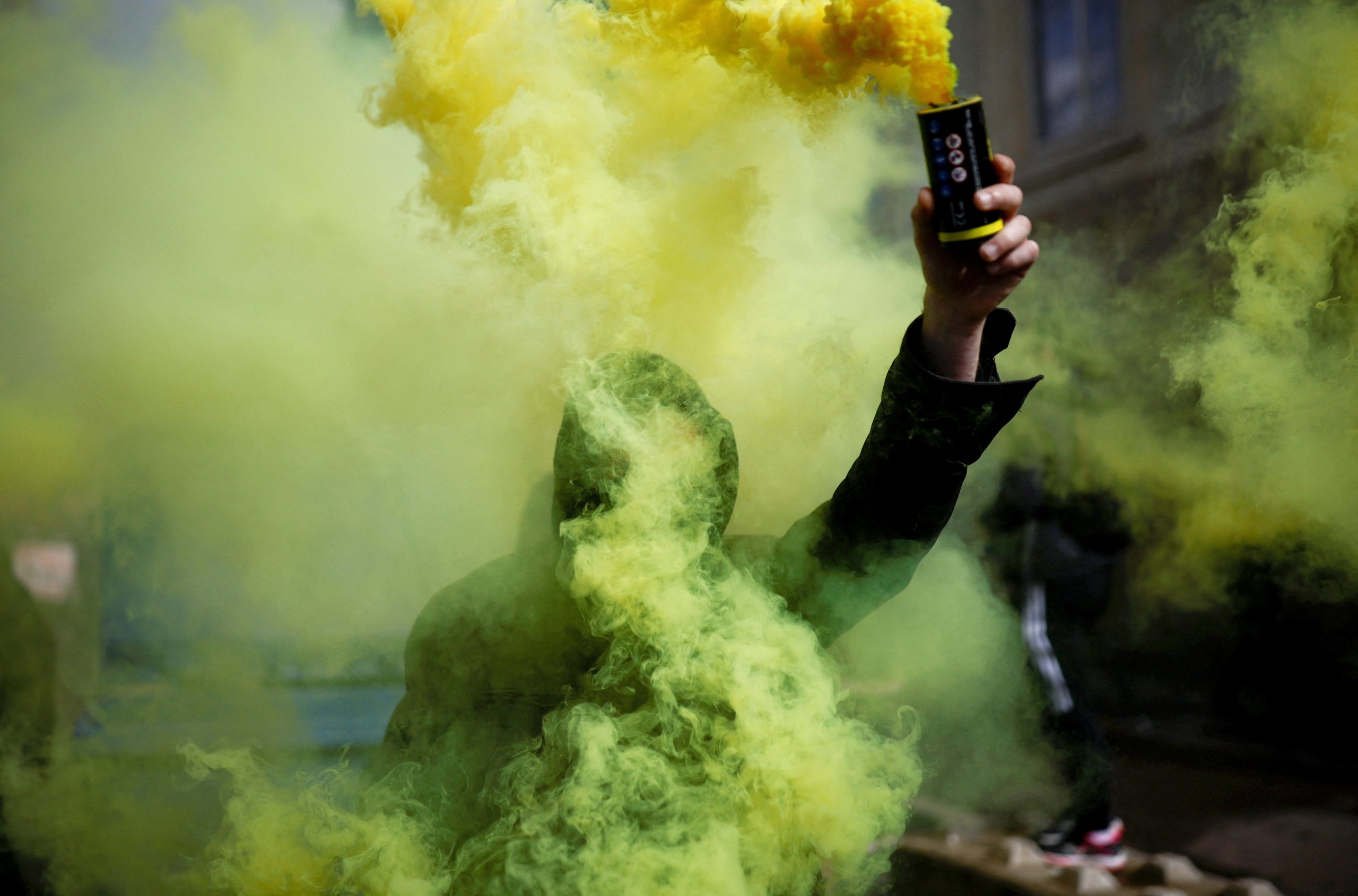
[elfsight_social_share_buttons id=”1″]
President Emmanuel Macron’s government faces two motions of no confidence in the National Assembly on Monday after it bypassed the lower house to push through a deeply unpopular overhaul of the pension system that will raise the retirement age.
Violent unrest has erupted in several cities including the capital, Paris, and trade unions have promised to intensify their strike movement, leaving Macron to face the most dangerous challenge to his authority since the “Yellow Vest” revolt.
“It’s not a failure, it’s a total train wreck,” Laurent Berger, head of the moderate CFDT trade union told the newspaper Liberation.
Monday’s no-confidence votes look unlikely to pass, but the result could be tight. A successful no-confidence vote would fell the government and kill the legislation, which is set to raise the retirement age by two years to 64.
Finance Minister Bruno Le Maire on Sunday called the votes “a moment of truth” for the government.
To bring down the government, Macron’s opponents require the support of a majority of the 577 lawmakers, in an alliance that would need to span from the hard left to the far right.
Senior officials from the conservative Les Republicains (LR) party have said they will not get behind the no-confidence motions. But there are rebels among their ranks.
One of them, Aurelien Pradie, who was removed from his post as number 2 in the party over his opposition to the pension legislation, said about 15 LR lawmakers were ready to back the tripartisan motion.
Le Monde calculated that at least 26 LR lawmakers would need to back the motion for it to succeed.
Even if the motions flop, Macron’s failure to find enough support in parliament to put his pension system overhaul to a vote has undermined his reformist agenda and weakened his leadership, observers say.
“The government would remain in place, although it would be significantly weakened, while social protests against the reform would likely continue for some weeks, which could negatively affect the French economy,” Barclays said in a briefing note.
An Elabe opinion survey showed two-thirds of French people wanted the government to fall, underlining the public perception challenges Macron faces ahead.
Other surveys showed his own popularity falling to its lowest since the 2018/2019 Yellow Vest uprising, a revolt that started as a grassroots protest movement against higher diesel taxes but morphed into a broader anti-Macron rebellion.
“This is perhaps the last democratic moment for the Assembly to make the government think twice,” said Frederic, a Paris resident who preferred not to give his family name.
PROTESTS CONTINUE DESPITE BANS
Paris police clashed with demonstrators over the weekend as thousands of people marched throughout the country amid anger at the government pushing through a rise in the state pension age without a parliamentary vote.
“Macron, Resign!” and “Macron is going to break down, we are going to win,” demonstrators chanted on the Place d’Italie in southern Paris. Riot police used tear gas and clashed with some in the crowd as trash bins were set on fire.
Municipal authorities had banned rallies on Paris’s central Place de la Concorde and nearby Champ-Elysees on Saturday night after demonstrations that resulted in 61 arrests the previous night. There were 81 arrests on Saturday night.
On Saturday, in the French capital, a group of students and activists from the “Revolution Permanente” collective briefly invaded the Forum des Halles shopping mall, waving banners calling for a general strike and shouting “Paris stand up, rise up”, videos on social media showed.
GRÈVE / RETRAITES : Des manifestants ont envahi le forum des Halles à Paris. pic.twitter.com/DltCfnchNU
— Infos Françaises (@InfosFrancaises) March 18, 2023
BFM television also showed images of demonstrations underway in cities such as Compiegne in the north, Nantes in the west, and Marseille in the south. In Bordeaux, in the southwest, police also used tear gas against protesters who had started a fire.
“The reform must be implemented … Violence cannot be tolerated,” Finance Minister Bruno Le Maire told Le Parisien newspaper.
A broad alliance of France‘s main unions has said it would continue to mobilize to try to force a U-turn on the changes. A day of nationwide industrial action is scheduled for Thursday.
Rubbish has been piling up on the streets of Paris after refuse workers joined in the action.
Rolling strikes at refineries entered a 13th day. Production at the 240,000 barrels-per-day (bpd) Normandy refinery and the 119,000 bpd site at Feyzin was reduced as a blockade on shipments left storage tanks near full.
Copyright 2023 Thomson/Reuters
